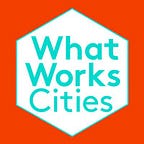The What Works Cities Economic Mobility Cohort
Meet the cities working with What Works Cities to accelerate economic mobility
Nine American cities are participating in the inaugural What Works Cities Economic Mobility initiative. As part of this project, What Works Cities and its five partner organizations have been working closely with each city to develop, test, and evaluate the early impact of a locally-led pilot program to help advance the city’s economic mobility needs and priorities. Each city is partnering with local community organizations, their county, or other relevant local partners to implement a pilot program and tackle their specific economic mobility challenges head-on.
Learn more about each city’s program focus and their locally-led pilot program, below.
CINCINNATI, OH: Low-income workforce support and services
The City of Cincinnati and the Cincinnati Chamber’s Workforce Innovation Center are aiming to increase job stability and wages while decreasing turnover by 10% for frontline employees by working with employers to implement business practices that improve employee job stability and advancement.
Read more here.
DAYTON, OH: Parental engagement in early childhood education
The City of Dayton and Preschool Promise are working to decrease racial gaps in preschool attendance and achievement among the City’s four-year-olds via text messaging parents with attendance reminders, helping parents address common attendance barriers, and developing and marketing play-based learning opportunities.
Read more here.
DETROIT, MI: Tenant support and services in affordable housing
The City of Detroit is working to decrease financially-motivated evictions in regulated affordable housing as part of a five-year goal of preserving 10,000 units of affordable housing by providing free financial counseling and related services to residents with early warning signs of housing instability.
Read more here.
LANSING, MI: Financial empowerment tools for residents
The City of Lansing, together with community partners, is helping families plan and afford post-secondary education. The project team is focused on ensuring that families know where to go to easily build savings and get support to go to college or receive career training by packaging a range of related services into a single, easy system.
Read more here.
NEW ORLEANS, LA: Career readiness services for youth
The City of New Orleans and YouthForce NOLA are aiming to increase the number of youth completing quality internships in high-mobility fields. Their goal is to increase local hires in growth industries by developing 6 internship modules that can be rolled out to employers across the City and by making it easier for youth to participate by streamlining documentation requirements.
Read more here.
NEWARK, NJ: Reducing eviction rates
The City of Newark is working to expand its eviction reduction strategies: increasing landlord registrations with the City by 5 to 10% by 2021, providing tenants more access to information about the eviction process, and increasing awareness and reach of the Office of Tenant and Legal Services by expanding the Office’s evidence-based practice of providing legal representation to low-income tenants.
Read more here.
RACINE, WI: Career readiness via high school equivalency diplomas
In five years, the City of Racine and Higher Expectations for Racine County seek to graduate 2,000 adults with no high school diploma from the YWCA’s High School Equivalency Diploma (HSED) program by scaling the program and increasing support to career and post-secondary education.
Read more here.
ROCHESTER, NY: Matched savings program for income-eligible families
The City of Rochester and the Empire Justice Center are working to increase resident savings and decrease resident financial stress by piloting ways to help and incentivize families to save a portion of their tax credit and receive financial services.
Read more here.
TULSA, OK: Career education and job training for older youth
The City of Tulsa and Tulsa Community WorkAdvance are creating new ways to ensure that youth ages 18 to 24 living in North Tulsa have training and access to good jobs and benefits through improving recruitment strategies and coaching and work experience opportunities for disengaged youth.
Read more here.
The What Works Cities Economic Mobility Initiative is made possible by the generous support of Bloomberg Philanthropies, the Bill & Melinda Gates Foundation, and Ballmer Group.
